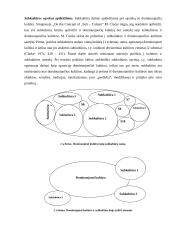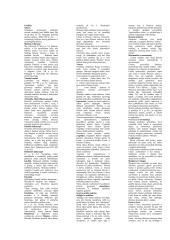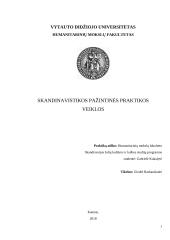Analizės
The French Riots: Will they change anything? Source analysis
Life in multicultural society over the years brought Europe many different consequences. Postcolonial times in Western culture are usually viewed through many complex perspectives, therefore, it is highly open for debates. In the recent decade immigration and integration problems are one of the most escalated topics in the public field. Riot in the suburbs of Paris in 2005 can be considered as an important example of absence of peaceful communication between different ethnic groups.
The French Riots: Will they change anything? Source analysis Life in multicultural society over the years brought Europe many different consequences. Postcolonial times in Western culture are usually viewed through many complex perspectives, therefore, it is highly open for debates. In the recent decade immigration and integration problems are one of the most escalated topics in the public field. Riot in the suburbs of Paris in 2005 can be considered as an important example of absence of peaceful communication between different ethnic groups. These problems have been analyzed by politicians and scholars over the years, however, bringing more problematic information rather than solutions. After the events in 2005 a well known American freelance writer and journalist William Pfaff released an article “The French Riots: Will They Change Anything?” expressing his opinion towards French Muslim community. Therefore, this essay will assess Pfaff’s views, contribution and relevance to the present day as well as future opinions. William Pfaff was a frequent contributor to “The New York Review of Books” and as one could say, he described how and why dominoes fall, history ends, and civilizations clash (Synergie 1). Nevertheless, Pfaff’s opinion appears with a strong confidence which contributes to the statements of his works. “I am able to deal with something of great interest to me -- contemporary history -- and to be paid a reasonable living, in fact a very good living, for telling people what they're supposed to think about it. That's a very privileged position” (Pfaff 2). Pfaff’s article “The French Riots” describes and reviews the events that took place in November 2005 when young Muslim males engaged in a massive rioting, car-burning and arson in the suburbs of Paris and other French cities (McKay 1018). This anger outbreak was triggered by the incident when two boys died of electrocution while hiding from the police in the electrical substation. Police officers claimed that they did not have any pursuit of arrestment and that suspicious reaction was evoked by the fact that the boys started to run for not reason (McKay 1018). In Pfaff’s opinion, this sort of reaction can be easily understandable, since police attention in the suburbs where most of the people are immigrants usually mean random identity checks, suspicion for possession of drugs and engagement in a criminal activity. One may argue that actions such as running from the police can commonly be understood as a sign of illegal activity, however, Pfaff’s description of this phenomenon give an impression of inevitable order between the conflict groups. He reasons that “their grandfathers came to France, mostly form North Africa, to do the hard labor in France’s industry”, but after crisis in 1970s “ the unemployment rate in the zones where there has been the most violence is nearly 40 percent and among young people it is higher” (McKay 1018). Moreover, he also mentions that the people are “simply doing nothing because there is nothing for them to do”, in addition, “their fathers saw their manhood undermined by unemployment. These young men are doomed to be boys” (McKay 1018). It is difficult to claim if these are the true reasons for social distinction, however, it is visible that William Pfaff tries to establish a logical and commonly accepted truth as an answer to the problem. Looking from the perspective of an educated Western minded person W. Pfaff takes advantage of his authority to form a public opinion using superficial observations, therefore, the legitimacy of his conclusions and reasons presented can be taken into questioning. “Religion is important…in the French ghetto, it provides the carapace that protects against the France that excludes Muslims” (McKay 1018). With this statement William Pfaff brings his personal attitude towards both conflict groups. It is, nevertheless, possible to claim that his neutrality vanishes immediately with the usage of the word “ghetto”. The word “ghetto” originated in 1610s which meant “part of a city in which Jews are compelled to live, especially in Italy, from Italian ghetto is part of the city to which Jews are restricted, of unknown origin” (Harper 1). In addition, proved history of holocaust during WWII contributes to the fact that the word “ghetto” has a strong negative connotation. By using this word in his description William Pfaff creates ideas that can be interpreted as one of the reasons for social exclusion. He consciously chooses to makes a distinction in his use of language which gives a clear impression of “us vs. then” dichotomy. Nevertheless, religious references do not parallel the behavior that Pfaff describes. “It has no ideology and no purpose other than to make a statement if distress and anger”, claims Pfaff, and later he presents an opinion that “to the European Muslim, it seems that all of the powerful in the world are in collusion to exclude Muslims- or are at war with them”, “there are itinerant imams who can put the young ghetto Muslim on the road to danger and adventure in Afghanistan, Pakistan, Iraq” (McKay 1018). These statements not only stresses irrelevant connections, but also can be interpreted as racial comments, generalization of a problem. The same kind of opinion can be found in the article “Seven years after the riots, the suburbs of Paris still simmer with resentment “written by Angelique Chrisafis in 2012. In the first paragraph, she draws a picture of the crowd: ” In the entrance hall of a run-down block of flats, a group of teenagers stood hanging out, smoking, track-suit hoods up, shoulders hunched, seemingly nonplussed that they were getting drenched”(Chrisafis 1). Naturally, after comparing these types of articles, a question arises: if the people are truly different or our perception of then is different? And could this be a new ground for a shift in social identity building? “Henri Tajfel was a British social psychologist who first proposed the Social Identity Theory in 1979 (McLeod 1). He argued that “social identity is a person’s sense of who they are based on their group membership(s). Prejudiced views between cultures may result in racism; in its extreme forms, racism may result in genocide” (McLeod 1)” (Makareviciute 1). This concept can easily be applied in analyzing the article of William Pfaff. Considering the fact that most of his work stresses the presence of different groups and opinions it immediately draws a picture of a community which is highly divided, not homogeneous.” Virtually no children of the Muslim immigration are prominent in mainstream electoral politics; the political parties have yet to make a serious effort to include them” (McKay 1019). It is possible to assume that active participation in policy making can result into a positive adaptation. Moreover, in order to apply French social identity, creating conditions that would help to delete the “immigrant” status could be one of the ground stones for solving the problem. However, Pfaff also mentions French political parties and the fail in their efforts to construct a useful policy. In addition, it is difficult to make a clear distinction whether this article gives an objective overview of French society problems or presents a generalized opinion that does not give useful observations and can possibly worsen the situation by offending people. In fact, it seems that the world has already forgotten the horrible experience of Afro-American discrimination in United States as well as xenophobic exclusion of Jews, Poles and Italians until the 1960s that brought a great amount of social problems which should have already been a bitter lesson learned. However, present day experiences show that situation did not shift. 7 January 2015 twelve people were killed in the satirical newspaper office in Paris by armed Islamic radicals. The trigger of this event was a caricature of Muhammad that offended the Islam believers (Sayare 1). This tragedy is a perfect example of how large the issue of exclusion remains until today and that there is a sizable gap in communication between the conflict groups. Nevertheless, it can be related with the article of W. Pfaff in a way that history tends to repeat itself, not to mention the same social group participants. This again proves the fact that the absence of homogeneous social identity keeps the problems in a loop which periodically come to attention, but never get solved properly. Despite the fact that the article of William Pfaff can be considered more as an opinion rather than objective analysis, it does describe a popular view of the situation in French suburbs. The problem of this overview is the remaining question of solution. Moreover, no opinion can be considered bad as long as it does not cause negative reactions, however, considering the situation in present day France, this sort of article can be received in a highly sensitive way. By no means, it reflects one of the largest issues in Western Europe, although it is not the most appropriate source to reference in the near future. Bibliography • Chrisafis, Angelique. "Seven Years after the Riots, the Suburbs of Paris Still Simmer with Resentment." The Guardian. France Dispatch, 3 Nov. 2012. Web. 17 May 2015. http://www.theguardian.com/world/2012/nov/03/estate-racial-hatred-poisoning-france. • Harper, Douglas. "Online Etymology Dictionary." Online Etymology Dictionary. Dan McCormack, n.d. Web. 17 May 2015. http://www.etymonline.com/index.php?term=ghetto • Makareviciute, Aiste. The Use of Analogies in the Context of Social Identity. Working paper. N.p.: n.p., 2015. Web. • McKay, John P., et al. A History of Western Society. Boston: Bedfors/st.Martin’s. 2011.p. 1018-1019.Print. • Reseaux, Synergie. "William PFAFF-Biography - William Pfaff - News." William PFAFF-Biography. WILLIAM PFAFF 2010 UNLESS OTHERWISE SPECIFIED, n.d. Web. 17 May 2015.
Šį darbą sudaro 1613 žodžiai, tikrai rasi tai, ko ieškai!
★ Klientai rekomenduoja
Šį rašto darbą rekomenduoja mūsų klientai. Ką tai reiškia?
Mūsų svetainėje pateikiama dešimtys tūkstančių skirtingų rašto darbų, kuriuos įkėlė daugybė moksleivių ir studentų su skirtingais gabumais. Būtent šis rašto darbas yra patikrintas specialistų ir rekomenduojamas kitų klientų, kurie po atsisiuntimo įvertino šį mokslo darbą teigiamai. Todėl galite būti tikri, kad šis pasirinkimas geriausias!
Norint atsisiųsti šį darbą spausk ☞ Peržiūrėti darbą mygtuką!
- Kultūrologijos analizė
- 4 psl., (1613 ž.)
- Word failas 22 KB
- Lygis: Universitetinis
- ✅ Yra šaltiniai
Mūsų mokslo darbų bazėje yra daugybė įvairių mokslo darbų, todėl tikrai atrasi sau tinkamą!
Kiti darbai
Privalumai
Atsisiuntei rašto darbą ir neradai jame reikalingos informacijos? Pakeisime jį kitu nemokamai.
Pirkdamas daugiau nei vieną darbą, nuo sekančių darbų gausi 25% nuolaidą.
Išsirink norimus rašto darbus ir gauk juos akimirksniu po sėkmingo apmokėjimo!
Atsiliepimai





















